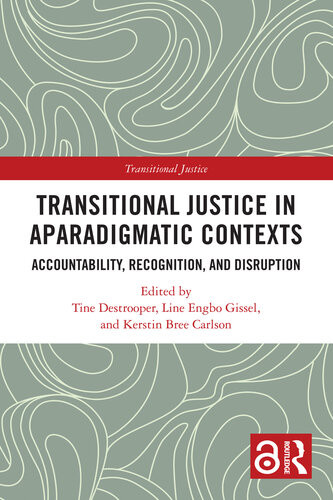

Most ebook files are in PDF format, so you can easily read them using various software such as Foxit Reader or directly on the Google Chrome browser.
Some ebook files are released by publishers in other formats such as .awz, .mobi, .epub, .fb2, etc. You may need to install specific software to read these formats on mobile/PC, such as Calibre.
Please read the tutorial at this link: https://ebookbell.com/faq
We offer FREE conversion to the popular formats you request; however, this may take some time. Therefore, right after payment, please email us, and we will try to provide the service as quickly as possible.
For some exceptional file formats or broken links (if any), please refrain from opening any disputes. Instead, email us first, and we will try to assist within a maximum of 6 hours.
EbookBell Team

4.7
86 reviewsThis book explores the practical and theoretical opportunities as well as the challenges raised by the expansion of transitional justice into new and 'aparadigmatic' cases.
The book defines transitional justice as the pursuit of accountability, recognition and/or disruption and applies an actor-centric analysis focusing on justice actors' intentions of and responses to transitional justice. It offers a typology of different transitional justice contexts ranging from societies experiencing ongoing conflict to consolidated democracies, and includes chapters from all types of aparadigmatic contexts. This covers transitional justice in states with contested political authority, shared political authority, and consolidated political authority. The transitional justice initiatives explored by the wide range of contributors are those of Afghanistan, Belgium, France, Greenland/Denmark, Libya, Syria, Turkey/Kurdistan, UK/Iraq, US, and Yemen. Through these aparadigmatic case studies, the book develops a new framework that, appropriate to its expanding reach, allows us to understand the practice of transitional justice in a more context-sensitive, bottom-up, and actor-oriented way, which leaves room for the complexity and messiness of interventions on the ground.
The book will appeal to scholars and practitioners in the broad field of transitional justice, as represented in law, criminology, politics, conflict studies and human rights.
The Introduction, Chapter 8 and the Concluding Remarks of this book are freely available as a downloadable Open Access PDF at http://www.taylorfrancis.com under a Creative Commons Attribution-Non Commercial-No Derivatives (CC-BY-NC-ND) 4.0 license.